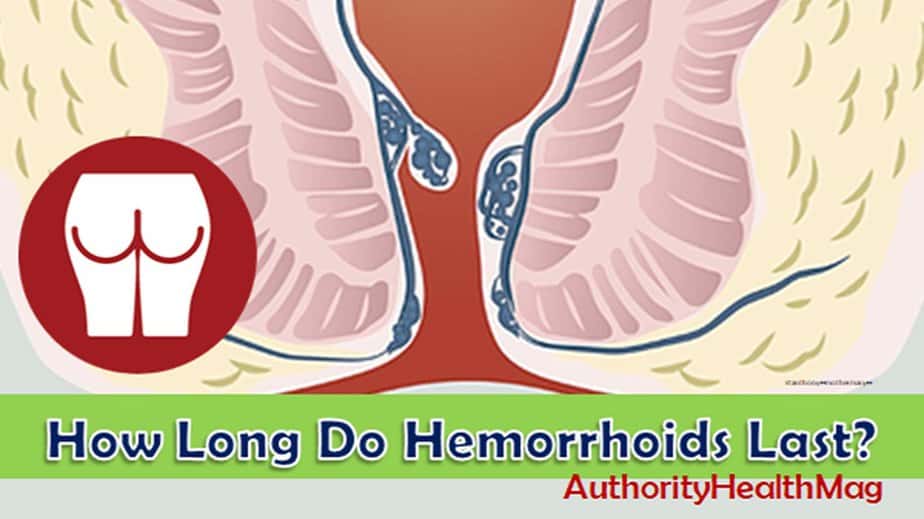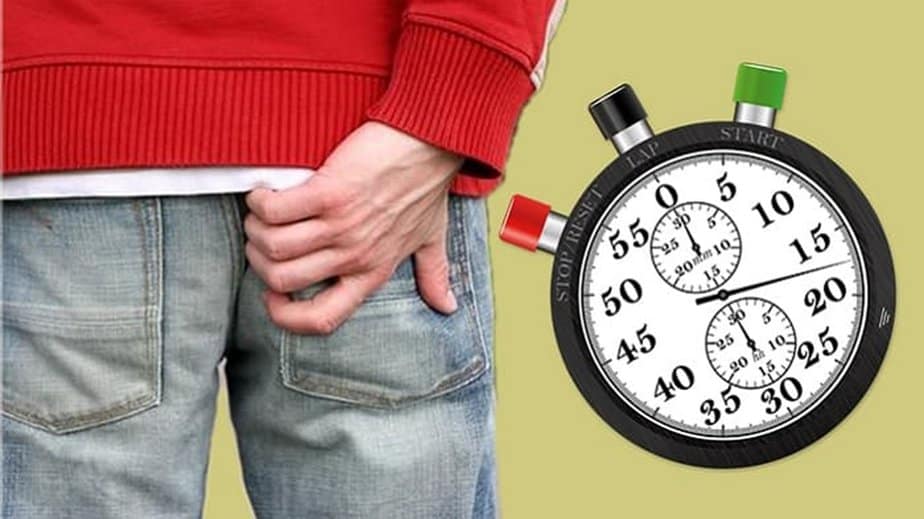Hemorrhoids are common among children and adults.
Yet, people in the age bracket of 45 to 65 are most vulnerable to piles.
According to some estimates, 75 percent of people will have hemorrhoids at some point.
Three out of every four people get piles at least once in life.
The pains and pangs of this disease are tormenting.
Most patients are seriously worried about how long the hemorrhoids last.
How long does it take for hemorrhoids to shrink and heal? That depends on several factors. We are coming to all that in the latter parts of this article.
What Are Hemorrhoids
Hemorrhoids are swollen veins around the anus.
Piles can occur externally or internally.
Internal hemorrhoids occur inside the rectum, while external hemorrhoids happen outside the anal opening.
Inflammation in the exterior part of the anus can be very itchy and painful compared to the interior one.
Burst hemorrhoids cause bleeding from the anus during bowel movements.
Occasionally, a clot can form in hemorrhoid (thrombosed hemorrhoid).
Hemorrhoids symptoms
Many hemorrhoid patients do not realize the onset of the illness during the initial period. If you know the signs of piles, you can easily diagnose them.
According to a Mayo Clinic report, the symptoms of hemorrhoids include:
- Painless bleeding during bowel movements; you may find traces of red blood on your toilet paper.
- Pain and irritation in the rectum and anus
- Continuous itching in and around the anal region
- Sensitive or painful lumps grow around the anus opening.
- Swelling around the anus.
Don’t be alarmed if you notice some traces of blood on your toilet tissue paper or stool. Bleeding during bowel movements can happen for other reasons as well.
Risk factors and common causes of hemorrhoids
According to a research report published by the International Journal of Pharmacy and Pharmaceutical Sciences, the actual causes of hemorrhoids are unknown.
Early studies didn’t find much evidence that body habits, diet, being inactive, wearing tight clothes, climate, or personality were to blame for piles. Obesity is also a risk factor for hemorrhoids.
People may develop hemorrhoids under the following circumstances or conditions:
- spinal-cord injuries
- erratic bathroom habits
- chronic diarrhea
- constipation
- postponing bowel movements
- straining during bowel movements
- a poor-fiber diet
- Excessive dehydration.
Some of the recent studies have found a few more reasons for piles, such as:
- the weakness of blood vessel walls in and around the rectum
- genetic predisposition
- excessive adnominal pressure from many causes
- prolonged forceful Valsalva defecation
- Constipated stool in the rectal ampulla.
How Long Do Hemorrhoids Last

It depends on the severity of the inflammation and the patient’s health conditions.
In many cases, hemorrhoids will go away on their own within a few days.
The disease symptoms may clear within a few days if you have a minor or small hemorrhoid. In such cases, medication may not be required. A few changes in diet and lifestyle habits can do magic.
Sometimes internal hemorrhoids prolapse or protrude outside the anus. Prolapsed hemorrhoids are a recurring incidence in many patients.
Larger hemorrhoids with protruding lumps around the anus take a longer time to heal. If the condition is severe, your physician may even perform minor surgery to remove the lumps. It may take a few weeks to completely overcome the issue.
Women who get hemorrhoids during pregnancy may have to wait until childbirth to get rid of the disease. Pile formation during pregnancy usually happens in the third trimester. The increased abdominal pressure makes the veins in her rectum and anus larger.
How long does it take for hemorrhoids to shrink and heal?
There is no specific time frame for how long it takes for the hemorrhoids to shrink and heal.
Patients suffering from recurring incidences of hemorrhoids may take longer to heal.
Medical intervention is necessary to get rid of piles fast.
Herbal remedies work to eliminate this inflammatory disease in the anus. But they take a little longer than prescription medicines.
Recovery time also depends on how fast and well the patient’s body responds to the medicines.
In most cases, hemorrhoids may last up to three weeks, though they start shrinking within a week.
A surgical process known as hemorrhoidectomy removes big lumps around the opening of the anus caused by piles. After the surgery, it may take several weeks to achieve complete healing.
Prolapsed hemorrhoids take a much longer time to shrink and heal.
Do Hemorrhoids Go Away On Their Own
Small external and internal hemorrhoids usually disappear on their own within ten days.
Often, the patients don’t even realize they have had a hemorrhoid problem.
If the pile is not serious, some natural home remedies can quickly reduce its symptoms. Home remedies help reduce the pain, itching, and irritation caused by the illness.
A severe hemorrhoidal inflammation will not go away on its own if the following symptoms exist:
- Continuous rectal bleeding
- Severe pain, itching, and unbearable irritation
- Despite the use of home remedies, hemorrhoids persist and increase as the days pass by.
- The stools you pass look maroon or tarry in color.
You must consult your physician and follow the recommended treatments if such symptoms exist.
The Mayo Clinic recommends the following recommendations to make hemorrhoids heal by themselves:
- Eat high-fiber foods and drink a lot of fluids.
- Avoid straining the anus and rectum while pooping.
- Avoid sitting on the toilet for a long time.
- Keep the anal area clean.
- Avoid using dry toilet paper.
- Soak the affected area frequently in a warm bath or sitz bath.
- Use topical treatments like OTC creams and pads.
- Apply ice packs or cold compresses.
- Do not hold up the urge for a bowel movement.
- Keep your legs on a small stool to reduce the strain on the rectum while sitting.
- If you are pregnant, sleep on your side to relieve pressure on the anus.
- Use fiber supplements like psyllium (Metamucil) or methylcellulose (Citrucel) to make bowel movements smooth and easy.
Best Medical Treatment Options For Hemorrhoids
Small hemorrhoids that occur in the majority of people heal on their own without the use of prescription medications. A little change in lifestyle and diet habits is more than enough to get well.
But you should visit a doctor if you suffer from severe hemorrhoids with continuous pain, bleeding, and growing lumps around the anus.
Depending on the condition of your hemorrhoids, your doctor may recommend medical procedures to shrink and heal the hemorrhoids.
Here are some of the commonly followed treatments for hemorrhoids:
Rubber band ligation: Tying a tight rubber band around the base of lumps to cut off the blood supply to hemorrhoids.
Infrared coagulation: using infrared light, heat, or extreme cold to shrink hemorrhoids.
Sclerotherapy: Injecting chemicals to shrink the hemorrhoids.
Surgery: When all other treatment options do not work, or the hemorrhoids are large, use a surgical process to remove the lumps.
Stapling: Stapled hemorrhoidectomy, or stapled hemorrhoidopexy, is used in treating internal hemorrhoids. This heals the internal hemorrhoids by blocking the blood flow to hemorrhoidal tissues.
DIY Solutions For Hemorrhoids
Home remedies help in inflammation and swelling resulting from hemorrhoids. They also help in getting relief from pain and itchiness.
Here are some of the proven home remedies that work well for managing the symptoms of piles:
Witch hazel: Tannins reduce bleeding and swelling; they heal and shrink piles quickly.
Aloe vera: It soothes inflamed skin by reducing swelling, pain, and itching.
Apple cider vinegar: It is effective in reducing inflammation and itching.
Tea tree oil: Anti-inflammatory and antimicrobial properties of this TTO alleviate pain and itching and shrink swollen veins.
Cold compress: It numbs the inflamed skin to reduce pain and itching and shrinks the swollen veins.
Sitz bath: Sit in warm water (preferably with Epsom salt and witch hazel added) to help relieve pain and itching in the anus, which also cleanses the perineum.
Note that if you have persistent bleeding and pain for a week, you must see a doctor.
Do Hemorrhoids Return
A recurring occurrence of hemorrhoids can happen.
When the patient fails to keep up with the required lifestyle and diet habits, the chances of hemorrhoids returning are very high.
One study in 2004 observed 231 hemorrhoid patients checking the recurrence rate of hemorrhoids. The results showed that Hemorrhoids recurred in 6.3 percent of the people who had surgery and in 25.4 percent of those who healed hemorrhoids with home remedies.
To stop the return of hemorrhoids, consciously eliminate the specific causes that are responsible for hemorrhoids in you.
How Can You Prevent Hemorrhoids
Here are a few diet and lifestyle changes needed for preventing the recurrence of piles:
- Identify the shortfalls in your diet and lifestyle habits responsible for your hemorrhoids.
- Continue to use the home remedies twice or thrice a week to prevent the recurrence of piles.
- Compulsorily include high-fiber foods in your daily diet; drink at least 8 cups of water.
- Engage in active physical exercises for at least 30 minutes daily for better bowel movements.
- If you are overweight, reduce your weight.
- Choose comfortable sitting and eating positions to reduce strain on the rectum.
Recommended reading list:
